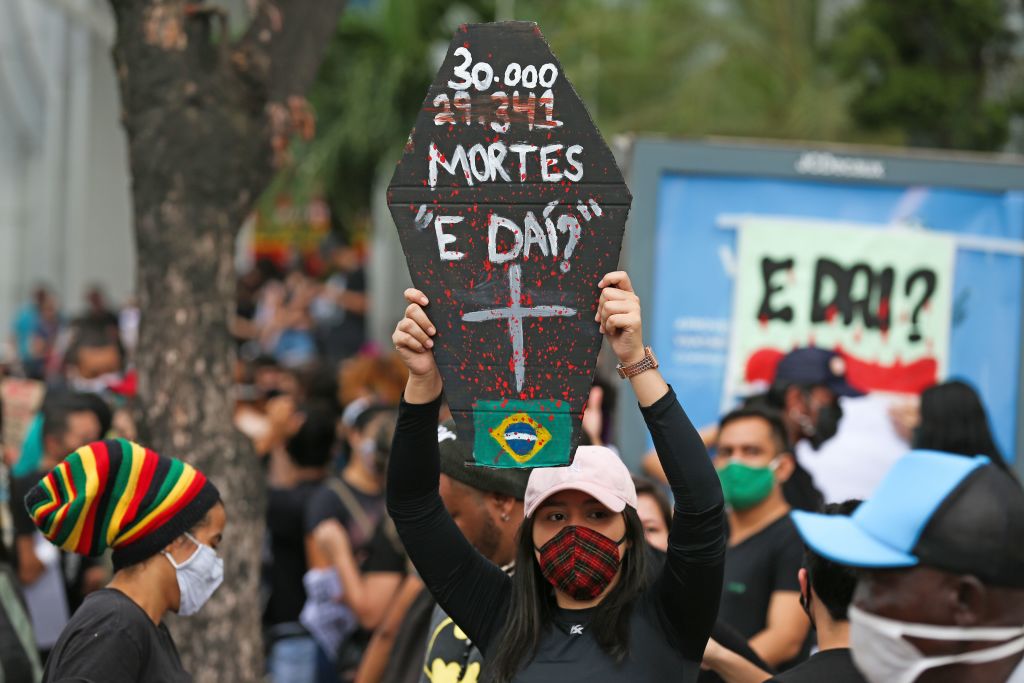Coronavirus is devastating Brazil. 31,000 people have died and the country has 558,000 confirmed cases (the actual toll is believed to be much higher). But even in the midst of a global pandemic, the state’s war on the favela drug gangs continues unabated.
It was six o’clock in the morning on May 15 when Tiê Vasconcelos woke up to the sound of heavy artillery. ‘My first reaction, as always, was to lie down on the floor’, says the 25-year-old community organiser and YouTuber, who lives in the Complexo do Alemão favela, a sprawling impoverished community in the north of Rio de Janeiro. ‘There was an intense exchange of fire, heavy noises, sounds of war, grenade explosions, armoured vehicles roaming the streets’. The terror was the result of a police incursion, led by Rio’s elite squad known as BOPE (Battalion of Special Police Operations), aimed at capturing local drug traffickers. Eight machine guns were recovered and 13 people died in the operation.
More than 11 million Brazilians live in favelas. Killings at the hands of police is nothing new to residents in those communities, who for decades have been caught in the crossfire of the state’s vicious war on drugs. But at a time when people have been advised to stay at home due to the coronavirus pandemic, the expectation was that authorities would put a halt to such police operations. Not so. Three days after the bloodbath in Alemão, Joao Pedro, 14, was shot during a police operation in Complexo do Salgueiro Favela, in São Gonçalo, a city facing Rio de Janeiro across Guanabára Bay.
These skirmishes between drug gangs and security forces continue alongside a new terror: Covid-19. The virus spreads easily in the cramped favelas, where people live cheek-by-jowl. Brazil’s grossly underfunded public health system and a federal government led by a president who appears intent on undermining measures to thwart the disease’s spread, only makes matters worse for many Brazilians.
Jair Bolsonaro refuses to wear a mask in public, has been filmed in public shaking people’s hands, and encouraged his supporters to go out onto the streets to protest against lockdown measures imposed by state governors, claiming the paralysis is hurting the economy. Since the beginning of the pandemic, Bolsonaro has gone through two health ministers — the last one, Nelson Teich, stayed in the job for less than a month.
In the absence of the state, favelas have had to organise. Local activists, artists, and donors have rallied together to distribute food, home-made masks, and hand-sanitiser to families in need. But even in the midst of an unprecedented crisis, for the city’s security apparatus little has changed. In the west of Rio, five days after João Pedro’s killing, BOPE soldiers invaded the City of God favela, where the famous film by the same name was shot. Without warning, local volunteers distributing food found themselves in the middle of an all-too-familiar battle, with all-too-familiar victims. This time, an 18-year-old boy was shot dead by police while on his way to a shop to buy a kite.
In October 2018, Bolsonaro was elected with 55 per cent of the votes. His rise to power came at a time when the Brazilian political establishment was plagued by corruption scandals, almost 13 million people were out of a job (12.1 per cent of the workforce), and crime levels were at a record high. Inspired by his American counterpart, Bolsonaro presented himself as an uncompromising outsider, unsullied by corruption, who would be tough on crime, and open up the economy to private investment. To convince Brazilians he could get the job done, he targeted people’s religious and nationalistic nerves. His motto: Brazil above everything, and God above all.
Two years in, and it hasn’t exactly gone smoothly for Bolsonaro and his government. Only a third of Brazilians are happy with their president, according to a recent poll. Initially encouraged by his no-nonsense approach, hopelessness is setting in. Unemployment is still hovering around the 12 per cent mark, and the country remains one of the most violent in the world. When it comes to stamping out corruption his government has disappointed: there are six ongoing investigations involving political allies or members of the Bolsonaro family. The main case being pursued involves Bolsonaro’s two sons, Carlos and Eduardo, who allegedly masterminded an online campaign against political opponents with the use of fake news. Many in Brazil’s congress are now calling for the start of impeachment proceedings against the president.
Not even Bolsonaro’s harshest critics can blame him for a virus that originated in a Chinese wet-market and managed to cause havoc the world over. Racism, corruption, and social inequality have plagued Brazil since pretty much the founding of the nation. But Bolsonaro’s toxic leadership, a rhetoric of divisiveness and vulgar language have certainly helped to stoke the flames of violence now spreading throughout Brazilian society.
Brazil has the world’s second highest number of coronavirus infections, with the country’s urban poor hardest hit. The damage Bolsonaro is inflicting on all citizens, though, will be felt for decades to come, long after this disease has been defeated.






Comments